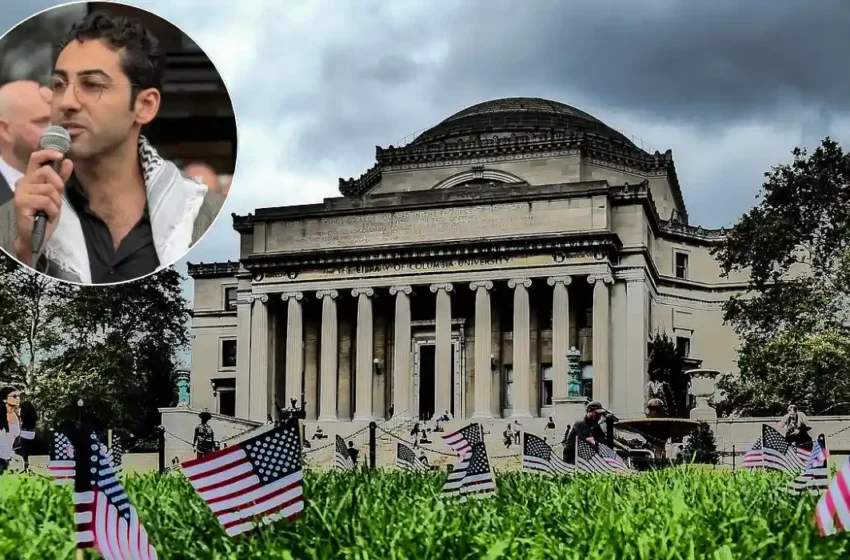
Burlington, Vermont (Europe Brief News) – Mohsen Mahdawi, the Columbia University student and prominent pro-Palestine protest leader, walked out of a Vermont courthouse a free man Wednesday after a federal judge ordered his release amid an ongoing deportation battle with the Trump administration.
The ruling marks a temporary reprieve in a case that has become a flashpoint in the national debate over free speech, immigration enforcement, and campus activism, as reported by Al Jazeera news.
Judge Orders Release Amid Deportation Proceedings
U.S. District Judge Geoffrey Crawford issued an order to free Mahdawi from his detention at Northwest State Correctional Facility after his arrest on April 14 became controversial. The official immigration agency seized the legal 24-year-old U.S. resident while he attended his citizenship interview before conducting his arrest, resulting in circulating video footage, which prompted strong criticism from overall observers.
Mahdawi washed out of the courthouse, keeping his shoulders draped with a traditional Palestinian keffiyeh and delivering peace gestures to supporters who celebrated his release.
Through an emotive speech, he spoke straight to former President Donald Trump about the aggressive student prosecutions pursued by his administration against pro-Palestine activists.
“I am not afraid of you,”
Mahdawi declared. Turning his attention to Gaza, he added,
“To my people in Palestine: I feel your pain, I see your suffering—and I see freedom, and it is very soon.”
Trump’s Crackdown on Pro-Palestine Protesters
Mahdawi’s detention occurred during the Trump administration’s systematic action to punish students of foreign origin who participated in demonstrations against Israel’s Gaza offensive. The previous president has repeatedly attacked pro-Palestine college activists for creating anti-Semitic environments at schools and has compelled universities to enforce stricter penalties on disruptive demonstrations.
During recent weeks, Immigration and Customs Enforcement agents detained at least twelve student visa holders whose protests occurred at Columbia University and additional schools. The Department of Homeland Security (DHS) has justified these actions by claiming some protesters violated the terms of their visas by participating in “unlawful assemblies.”
Civil rights groups claim the administration mixes up political expressions with criminal conduct.
“This isn’t about security—it’s about silencing opposition under the guise of enforcing immigration law,”
said Layla Ahmad, an attorney representing several detained protesters.
“The government is sending a chilling message: If you speak out, you risk deportation.”
Legal and Political Implications
Mahdawi’s supporters’ victory remains uncertain because his legal situation remains unresolved. The Department of Homeland Security argues that Mahdawi violated his residency conditions because of his participation in the Columbia protests through his prolonged presence at the university campus.
Expert legal advisers caution that the successful deportation of Mahdawi by the administration would create dangerous implications for employing immigration enforcement to silence political activism.
“They’re testing how far they can go in punishing protesters by revoking their right to stay in the country,”
said Daniel Harlow, a constitutional law professor at the University of Vermont.
“This isn’t just about Mohsen—it’s about whether the government can strip non-citizens of their free speech protections.”
Mixed Reactions Reflect National Divide
The legal case created an additional division between the opposing sides of the public. Free speech advocates, together with pro-Palestine activists, support Mahdawi by viewing his detention as a violation of democracy.
“Mohsen’s arrest was meant to intimidate us, but it’s only made our movement stronger,”
said Emma Ruiz, a fellow Columbia protester.
Meanwhile, Trump supporters have applauded the administration’s hardline stance.
“If you’re in this country on a visa, you follow the rules—not take over campuses and spread hate,”
said Mark Dobson, a New York construction worker.
As Mahdawi prepares for the next phase of his legal battle, he remains defiant.
“This fight isn’t just about me,”
he told reporters outside the courthouse.
“It’s about whether America still stands for justice—or whether it will let fear silence dissent.”


